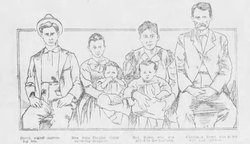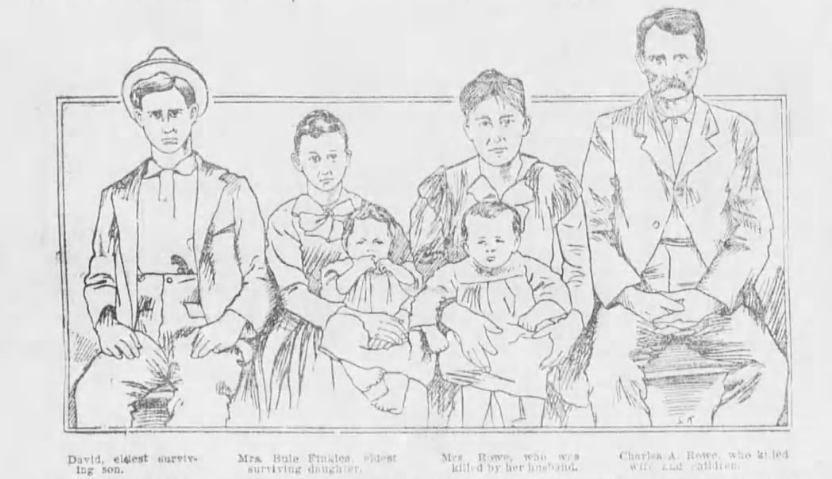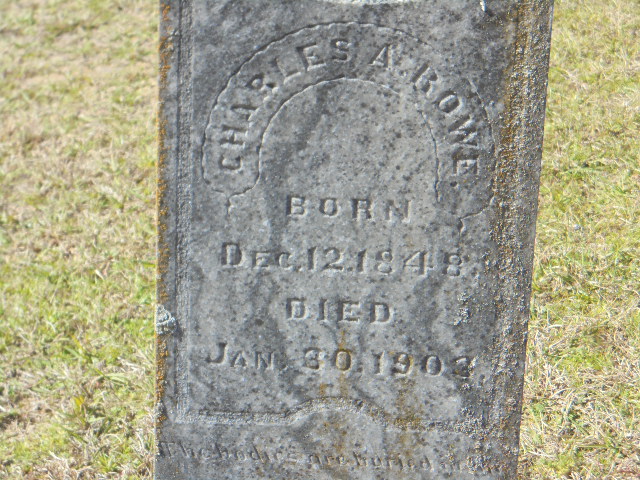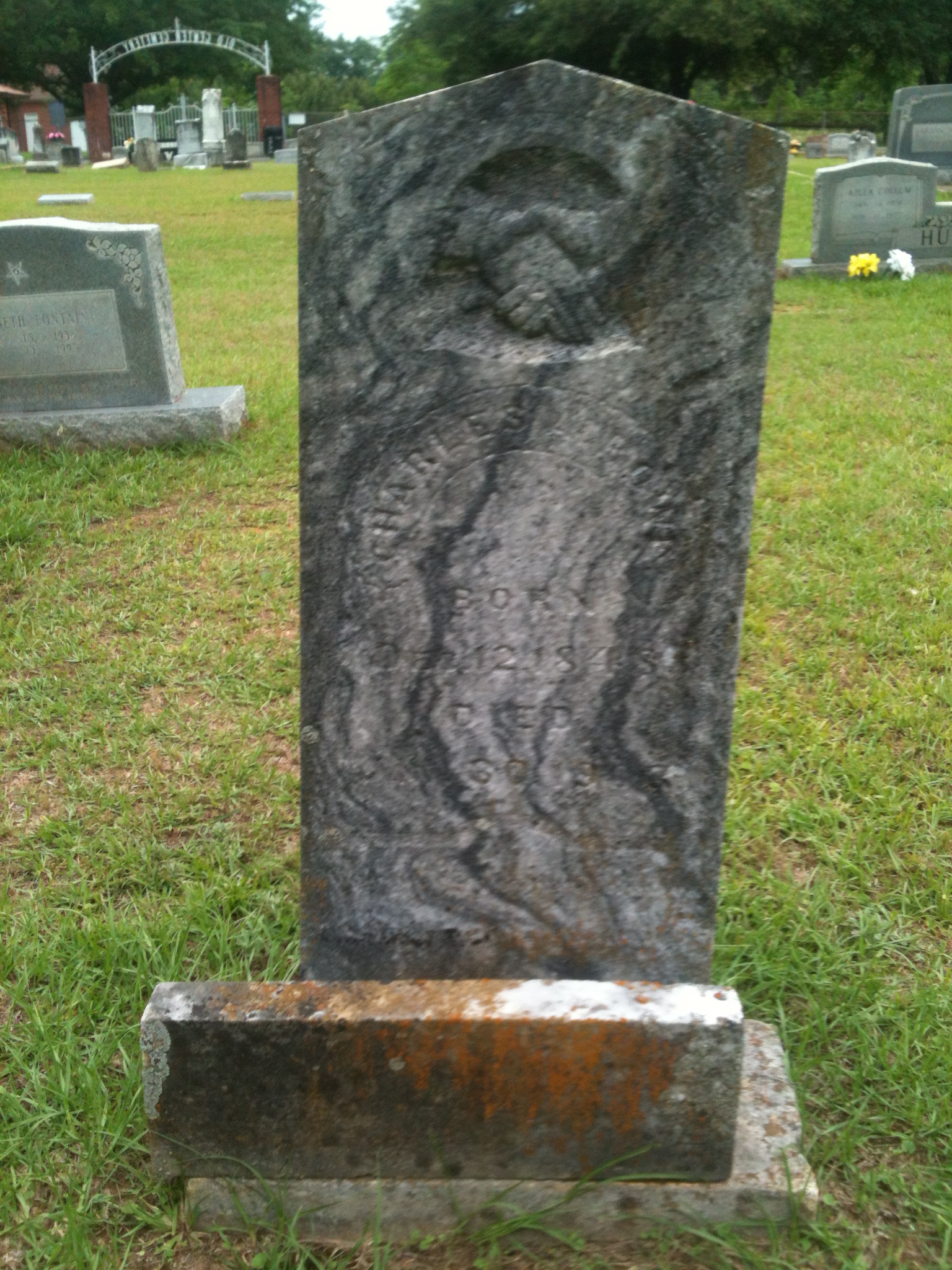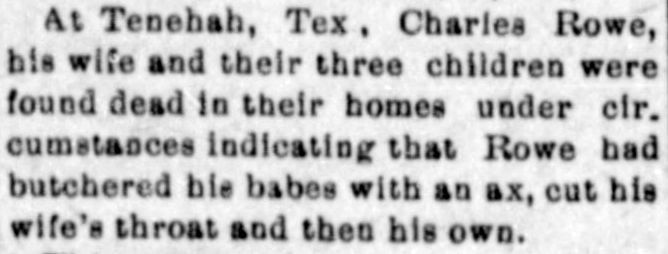Details of the Slaughter Related by the Minister Who Officiated at the Funeral.
To the Editor of The [Houston] Post.
Woods, Texas, February 2.—Many reports of the Rowe tragedy have gone out, from which erroneous theories might emanate. The surviving relatives of all the victims as well as the community have requested me to undertake the task of setting the true history of the case before the world. I am in possession of all the facts (doubtless) that the public will ever be able to obtain, having superintended the preparation of Mr. Rowe's body for interment and preached the joint funeral of the ill-fated family.
At 11:30, high noon, Friday, January 30, Mr. Robert Hathaway, a near neighbor, passed Mr. Charles A. Rowe's residence, and Mr. Rowe and wife were standing in front of their smokehouse door, where they had been hanging up some hams. At a few minutes past 12 o'clock Mr. David Rowe, eldest son of Charles, entered the front room of his father's dwelling, which was from his own home about 300 yards.
When he entered the room, he was greeted with the sight of his two little half-sisters of 6 and 4 years and one little half-brother of 2 lying on the floor, all on their left sides, with their left arms under their heads, and each one in the same manner gashed in the neck behind with an ax. There were no cuts in either of their heads.
Their heads were almost severed and each gash was carefully closed.
Magistrate Samuel Johnson was teaching the old Center school, about 200 yards from the scene, and was promptly summoned, as were also near-by neighbors, among whom was Mr. Joe Rowe, brother of Charles, who lives about the same distance away.
Excitement then ran to its highest and in thirty or forty minutes the community was astir. Search for the missing father and mother was at once begun, the result of which was first to find the mother, Maggie Needham Rowe, in the front vestibule of the barn, which is a perfect inclosure with ground floor and a flight of two steps into the main room of the building. She was sitting partly on the first step and partly on the ground, with her right knee upon the ground, head resting on her left arm (as were those of her children) on the second step, with a deep gash in the back of the neck, the same as the children. There was also a small gash in the left shoulder, and her apron was tightly drawn over the face with both hands.
No signal of alarm had been given that could have been heard at a distance of 200 yards.
Search was then resumed for the missing father. Some tracks were found that proved to be his, over in the field. By these the posse tracked him up to where his dead body lay, outside of his field on the opposite side, about half a mile from his home, lying behind a large log on the left side, with his hat folded in four folds under his head, his left arm stretched out in a lowered position, across which the right wrist rested, and a large stem butcher knife had fallen over at the right hand. He had borrowed the knife from his son-in-law, Mr. Jule Finkles, to use in cutting up his meat, but had not used it for that purpose. The meat was cut with a small pocket knife, which was found sticking in a log of the smoke house.
"Examination revealed that with this weapon his own life had been taken. Two efforts at his chest had been checked by the first bone above the left breast, and a third took effect immediately above ranging downward, passing just above the heart. There were also two terrible cuts at the jugular vein, one of which cut it through.
Mr. Rowe had been married three times and left two children by the first and one by the second marriage, having [illegible] all by the third that were living at the time of the awful tragedy.
He was prominent in the circles in which he moved, above an average in intellect and had acquired a fair education. He was raised in good circumstances and was a stranger to want. His father was one of the earliest settlers of this community and owned an abundance of land, was an acknowledged expert at surveying, and in 1854–55 represented Panola county in the lower house of the legislature, and his son, Charles, was born in this community December 12, 1848. Robert Rowe, great grandfather of Charles A., emigrated from England to this country in 1765. Shortly after he came to America he married Miss Elizabeth Wallace of Petersburg, Va. His grandson, James, father of Charles A., married Miss Myra Tipett of this community, who was Charles' mother.
Mr. Charles A. Rowe was to all appearance a kind and loving husband and father. He was extremely anxious about the present and future welfare of his wife and three little children. He had been addicted to morphine for some time and had reached the point where he saw that his days were about numbered, and whether in contemplation of the awful deed or not, he has recently asked if it would not be better for him to take his family with him out of the world, stating that he could see no way to be provided for them.
He was in better financial circumstances than the majority of his neighbors. Mr. Rowe was a man of high temper and very impetuous, a member of the Methodist church and seemingly an earnest seeker for the light of the truth. He was hospitable in his home, a good conversationalist and very charitable, and his house was always open to ministers of the gospel.
Of his wife, Maggie, daughter of a highly respected citizen of this community, Mr. J. F. Needham, too much can not be said in praise. She was known only to be loved and respected by all, a kind and loving wife, devoted and affectionate mother, patient and prayerful under all circumstances. She was 28 years of age and the mother of four children, three living at the time of the awful catastrophe and one dead. As above indicated, his elder two children were girls, and the 2-year-old baby was a boy. All were fair and beautiful, kindly disposed, loving children.
The heart-rending affair is clad in mystery and all theories are most certain to fall through, but the general conclusion here is that Mr. Rowe did not wish to leave those whom he loved behind him. This act was cunningly devised and the execution was the work of an artist. He seemed to be very careful to guard against mutilating the faces of his family. The ax with which he did the work was found by the foot approach between the house and dining room, covered with blood.
On Saturday evening at the interment the largest throng of humanity gathered at the church yard to see the last end of the slaughtered family that ever assembled in this community. Hundreds of people from every point of the compass led before the open caskets to look at the remains of the victims, after the difficult funeral had been preached.
While words of comfort are almost impossible, yet we can safely say that the heart-broken relatives of all the deceased have the deepest sympathy of the entire horror-stricken community. Over the dead we draw the mantle of charity, and at our departed neighbors and friends, we say, farewell. May God in His wisdom, have mercy overrule all things to the good of his people and to the glory of His august name.
[Rev.] H. L. Holden
—Published in The Houston Post (Houston, Texas), February 8, 1903, p. 34.
Added by Sheron Smith-Savage 2014
Details of the Slaughter Related by the Minister Who Officiated at the Funeral.
To the Editor of The [Houston] Post.
Woods, Texas, February 2.—Many reports of the Rowe tragedy have gone out, from which erroneous theories might emanate. The surviving relatives of all the victims as well as the community have requested me to undertake the task of setting the true history of the case before the world. I am in possession of all the facts (doubtless) that the public will ever be able to obtain, having superintended the preparation of Mr. Rowe's body for interment and preached the joint funeral of the ill-fated family.
At 11:30, high noon, Friday, January 30, Mr. Robert Hathaway, a near neighbor, passed Mr. Charles A. Rowe's residence, and Mr. Rowe and wife were standing in front of their smokehouse door, where they had been hanging up some hams. At a few minutes past 12 o'clock Mr. David Rowe, eldest son of Charles, entered the front room of his father's dwelling, which was from his own home about 300 yards.
When he entered the room, he was greeted with the sight of his two little half-sisters of 6 and 4 years and one little half-brother of 2 lying on the floor, all on their left sides, with their left arms under their heads, and each one in the same manner gashed in the neck behind with an ax. There were no cuts in either of their heads.
Their heads were almost severed and each gash was carefully closed.
Magistrate Samuel Johnson was teaching the old Center school, about 200 yards from the scene, and was promptly summoned, as were also near-by neighbors, among whom was Mr. Joe Rowe, brother of Charles, who lives about the same distance away.
Excitement then ran to its highest and in thirty or forty minutes the community was astir. Search for the missing father and mother was at once begun, the result of which was first to find the mother, Maggie Needham Rowe, in the front vestibule of the barn, which is a perfect inclosure with ground floor and a flight of two steps into the main room of the building. She was sitting partly on the first step and partly on the ground, with her right knee upon the ground, head resting on her left arm (as were those of her children) on the second step, with a deep gash in the back of the neck, the same as the children. There was also a small gash in the left shoulder, and her apron was tightly drawn over the face with both hands.
No signal of alarm had been given that could have been heard at a distance of 200 yards.
Search was then resumed for the missing father. Some tracks were found that proved to be his, over in the field. By these the posse tracked him up to where his dead body lay, outside of his field on the opposite side, about half a mile from his home, lying behind a large log on the left side, with his hat folded in four folds under his head, his left arm stretched out in a lowered position, across which the right wrist rested, and a large stem butcher knife had fallen over at the right hand. He had borrowed the knife from his son-in-law, Mr. Jule Finkles, to use in cutting up his meat, but had not used it for that purpose. The meat was cut with a small pocket knife, which was found sticking in a log of the smoke house.
"Examination revealed that with this weapon his own life had been taken. Two efforts at his chest had been checked by the first bone above the left breast, and a third took effect immediately above ranging downward, passing just above the heart. There were also two terrible cuts at the jugular vein, one of which cut it through.
Mr. Rowe had been married three times and left two children by the first and one by the second marriage, having [illegible] all by the third that were living at the time of the awful tragedy.
He was prominent in the circles in which he moved, above an average in intellect and had acquired a fair education. He was raised in good circumstances and was a stranger to want. His father was one of the earliest settlers of this community and owned an abundance of land, was an acknowledged expert at surveying, and in 1854–55 represented Panola county in the lower house of the legislature, and his son, Charles, was born in this community December 12, 1848. Robert Rowe, great grandfather of Charles A., emigrated from England to this country in 1765. Shortly after he came to America he married Miss Elizabeth Wallace of Petersburg, Va. His grandson, James, father of Charles A., married Miss Myra Tipett of this community, who was Charles' mother.
Mr. Charles A. Rowe was to all appearance a kind and loving husband and father. He was extremely anxious about the present and future welfare of his wife and three little children. He had been addicted to morphine for some time and had reached the point where he saw that his days were about numbered, and whether in contemplation of the awful deed or not, he has recently asked if it would not be better for him to take his family with him out of the world, stating that he could see no way to be provided for them.
He was in better financial circumstances than the majority of his neighbors. Mr. Rowe was a man of high temper and very impetuous, a member of the Methodist church and seemingly an earnest seeker for the light of the truth. He was hospitable in his home, a good conversationalist and very charitable, and his house was always open to ministers of the gospel.
Of his wife, Maggie, daughter of a highly respected citizen of this community, Mr. J. F. Needham, too much can not be said in praise. She was known only to be loved and respected by all, a kind and loving wife, devoted and affectionate mother, patient and prayerful under all circumstances. She was 28 years of age and the mother of four children, three living at the time of the awful catastrophe and one dead. As above indicated, his elder two children were girls, and the 2-year-old baby was a boy. All were fair and beautiful, kindly disposed, loving children.
The heart-rending affair is clad in mystery and all theories are most certain to fall through, but the general conclusion here is that Mr. Rowe did not wish to leave those whom he loved behind him. This act was cunningly devised and the execution was the work of an artist. He seemed to be very careful to guard against mutilating the faces of his family. The ax with which he did the work was found by the foot approach between the house and dining room, covered with blood.
On Saturday evening at the interment the largest throng of humanity gathered at the church yard to see the last end of the slaughtered family that ever assembled in this community. Hundreds of people from every point of the compass led before the open caskets to look at the remains of the victims, after the difficult funeral had been preached.
While words of comfort are almost impossible, yet we can safely say that the heart-broken relatives of all the deceased have the deepest sympathy of the entire horror-stricken community. Over the dead we draw the mantle of charity, and at our departed neighbors and friends, we say, farewell. May God in His wisdom, have mercy overrule all things to the good of his people and to the glory of His august name.
[Rev.] H. L. Holden
—Published in The Houston Post (Houston, Texas), February 8, 1903, p. 34.
Added by Sheron Smith-Savage 2014
Family Members
Sponsored by Ancestry
Advertisement
Advertisement
